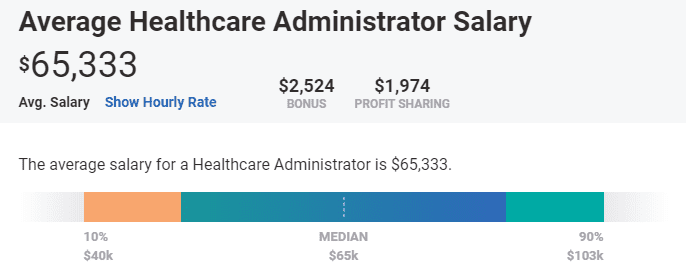With more and more college graduates pursuing careers in healthcare administration, business schools around the nation are under intense scrutiny. While business schools certainly help students acquire knowledge, there is a growing perception that they fall short in preparing students for the real business world.
That’s not healthy for healthcare business schools seeking to attract more applicants, rather than scare them away.
However, it’s not all doom and gloom. Becoming a healthcare administrator remains a viable career path.
Let’s break down some of the prominent considerations that healthcare MBA students should observe.

The Role of Healthcare Administrator
Believe it or not, there is no lack of confusion over just what exactly a healthcare administrator does.
A healthcare administrator’s role calls heavily on leadership. Those selected to work as healthcare administrators will help hospitals manage staff and balance budgets. They will drive organizational components to improve hospital profitability and patient outcomes.
In order to fully realize the position, a person needs to possess a clear understanding of healthcare laws and hospital internal processes.
Healthcare administrators don’t just work diligently to keep hospitals running smoothly; they also help pharmaceutical companies, nursing homes, and clinics around the world.
A healthcare administrator is a hero sans cape and glory. It’s an exciting career that makes a real-life impact and, at times, is thankless.
Healthcare Administrator Salary

According to Payscale.com, the average healthcare administrator’s salary is just north of $65,000. But that’s not the full story.
Healthcare administration has experienced a sharp rise in the total number of available positions over the years, prompted by ever-evolving medical technologies. With medical technology driving change, more administrators are needed to manage infrastructure.
Additionally, healthcare networks are rapidly consolidating. Two Texas-based healthcare organizations—Baylor Scott & White Health and Memorial Hermann Health Systems—formally announced a merger last October. The highly anticipated merger is expected to be completed by the end of 2019.
CVS Health acquired Aetna for nearly $70 billion. The acquisition papers were filed back in 2007; however, the deal was fiercely opposed: consumer activists and watchdog groups filed complaints to the court claiming that such a powerful concentration of healthcare power might not be good for consumers. But the Justice Department felt otherwise, eventually approving the deal.
The point is, networks are in need of healthcare administrators more than ever, which is leading to a rise in healthcare administrators’ salaries.
Alongside the rise in salaries is the increase in people seeking to enter the career. In 2016, there were 352,000 healthcare administrators working in the United States. By some estimates, that number will increase to 424,300 in 2026.
Healthcare Administrator Salaries Per Sector
Like any salary number, the sector or niche can influence the pay rate. For example, in Pittsburgh, the average salary for a nursing home administrator is $112,120 annually. When we consider Pittsburgh’s cost of living, this is an excellent salary.
A healthcare administrator’s education, experience, additional certifications, and skills, heavily influence salary.
The MBA Healthcare Track
In order to work as a healthcare administrator, you’ll need a minimum of a bachelor’s degree. But it’s recommended to take an MBA healthcare track to truly realize the full benefits of the position.
An MBA will help increase a healthcare administrator’s salary, clout, advancement potential, and job security.
Here are two approaches:
The Traditional MBA Journey

Students who earn an MBA, even without a healthcare concentration, are more sought after by major healthcare networks. When compared to those having only a traditional bachelor’s degree, healthcare administrators who have an MBA are considered more viable.
With an MBA, students can pursue specific healthcare careers:
- IT Management
- Marketing
- Human Resources
These are all thriving career options. However, it’s recommended that students who seek to work as a healthcare administrator secure a more focused degree.
The MBA With a Healthcare Concentration Journey
At West Liberty University, students can obtain an MBA with a concentration in Healthcare Management. WLU offers the Healthcare Management MBA online, making the experience more convenient for those with complicated schedules or those who don’t live near the university.
But convenience isn’t the only benefit of completing your healthcare MBA here.
Unlike many of the other regional programs that offer healthcare leadership options for graduate and post-secondary education, our program has unique coursework related to the healthcare revenue cycle.
How Our Healthcare MBA Is Different Than What You’ve Come To Expect
That’s not to say that having a deep-rooted understanding of the ethical frameworks required to run a healthcare facility is not valuable. However, none of the course work provided by other local institutions focuses directly on making those tough ethical decisions while also considering how they will impact the revenue of the health care system.
Our program does that through the inclusion of one particular 3-hour course – FIN 570 – Healthcare Finance and Revenue Cycle – but it is a distinguishing feature of our program that permeates the entire course load.
Students must complete prerequisites prior to acceptance into the MBA program.
The online atmosphere means that healthcare administration MBA students can take as much time as needed in earning an advanced degree. But it is possible to complete the coursework in under a year’s time.
Having an MBA with a Healthcare Concentration, healthcare administrators open themselves up to more plentiful opportunities.
Post-Healthcare MBA Career Opportunities
 Healthcare Law and Ethics
Healthcare Law and Ethics
In this field, healthcare administrators concentrate on the healthcare environment as it relates to patient care. The complex field drives the conversation regarding medical law, ethics, and responsibilities to patients.
While this is an underlying feature of all healthcare MBA programs, our program uniquely trains tomorrow’s healthcare administrators in this as well as revenue management.
The field is growing and is commonly populated by those people who yearn to make an impact on the lives of patients.
 Healthcare Accounting and Finance
Healthcare Accounting and Finance
Healthcare networks are consolidating across the country. This prompts the need for healthcare administrators who understand finance.
Strong financial understanding in healthcare also requires empathy and a good ethical foundation. You can’t just rely on a traditional MBA for the greatest professional success in the field of health care.
At the bottom, healthcare mergers and acquisitions are a reorganization of financial assets; thus, a strong understanding of accounting is a must for healthcare administrators.
 Healthcare IT Management
Healthcare IT Management
Healthcare technology continues its rapid evolution. More and more hospitals depend on robust technology to help them care for patients and perform procedures.
Healthcare IT management administrators help sustain, promote, and advance technological solutions that change lives.
Conclusion
Healthcare administration is a sought-after career path that’s both personally rewarding and highly compensated. However, competition among job seekers continues to grow. Because of this, advanced credentials such as a West Liberty University MBA with a Healthcare Concentration helps future and current administrators stand out from the herd.
With an abundance of healthcare administrator opportunities, it’s important to advance educational credentials beyond traditional accomplishments.